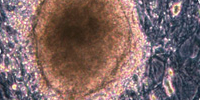
Lost in the debate about ethical and moral dilemmas surrounding human embryonic stem cell research are the considerable practical difficulties with using such cells as a tool in regenerative medicine. In 2006 Yamanaka and his colleagues reported that fully developed somatic cells can be induced to form pluripotent stem cells (iPSCs) that are functionally similar to embryonic stem cells. This groundbreaking discovery offered a possible solution to the controversial use of human embryos, but also the potential of deriving autologous cells from the patients who would be the ultimate recipients and beneficiaries of the regenerative products of their own iPSCs, reducing the problem of tissue rejection.
Progress since that initial discovery has been rapid, with major advances in increasing reprogramming efficiency and safety, as well ...

















